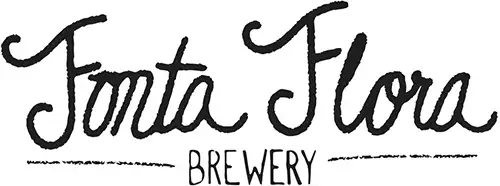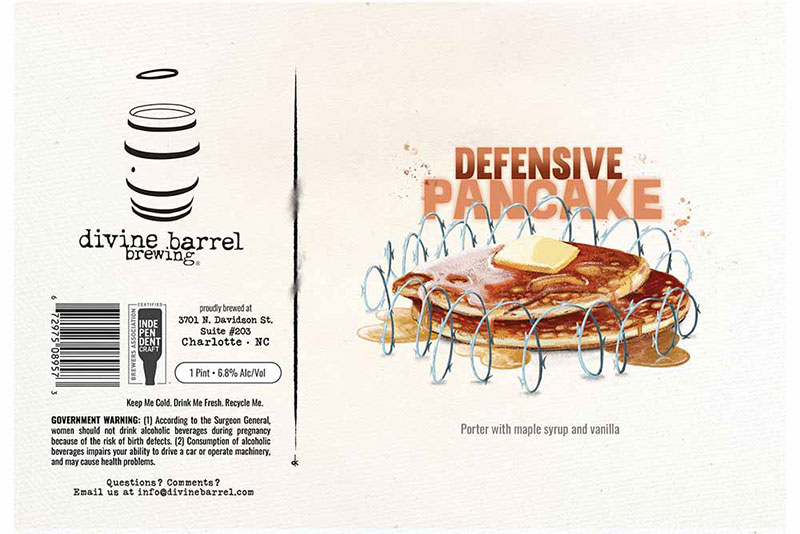
Making great beer is obviously an important part of a brewery’s process—whether you’re a nano, micro, or a full-blown production facility. But the reality is that you can’t just make great beer. You also have to focus outside of the can, developing a brand identity and marketing your beer. We’ve previously talked about the essentials of branding, shared the hottest packaging trends in beer, and showed how variety packs and can labels are great ways to stand out from the pack. Another path worth considering: beer names.
Naming your brewery highlights who you are as a company, while the name of each beer expresses personality and builds the brand. Other Half Brewing Co., Divine Barrel Brewing, and Burial Beer Co. are among the breweries with the most creative beer names. We chatted with each brewery to learn how they approach the process, any challenges they’ve run into along the way, and if they might ever run out of options.
(Above graphic courtesy of Divine Barrel Brewing)
What We’ll Cover in This Piece:
Affordable, Industry-Leading Brewery Software
How Experts Approach Coming Up With Beer Names
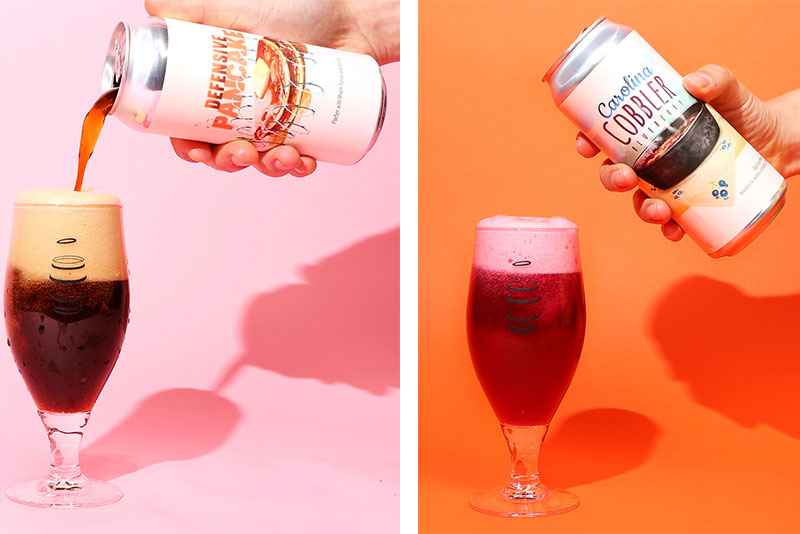
Photography courtesy of John A. Paradiso
Divine Barrel Co-Owner Gavin Toth says they’ve kept an alphabetized list of names on a spreadsheet that everyone has access to since day one.
“We have fun. Silly situations happen, and we come up with strange names and write them down,” Toth says. “You know how a cat chooses where to sit—if I fit, I sit? When we can’t decide [on a beer name], we put it up for a vote. We go to the spreadsheet and have seven different names, and tell the staff to check a box. Majority wins.”
Toth admits that sometimes they say they’re naming a beer something specific and it has to stick.
Meanwhile, Other Half Owner and Brewmaster Samuel Richardson says they have a mixed bag of an approach, but a lot of it is referential.
“We’ve been fairly opaque about the meanings,” Richardson says. “With a lot of the beer names, we reference things going on, and sometimes we make beer names that people will connect with.”
One of the more popular ones they make in their portfolio is Broccoli.
“Why should you drink a beer named Broccoli?” Richardson asks. “We’re just trying to have fun with it, but sometimes it’s more a mind game.”
Burial Head Brewer Phil Cassella explains how their naming approach evolved with the times, going from shorter a decade ago to much longer as the industry has boomed to nearly ten thousand breweries nationwide.
“As more and more breweries came on the scene, the names got longer. The approach morphed into the human experience. relating to emotion and experience someone on the team has experienced,” Cassella says. “Often the name doesn’t match the can art either, and is vague so the customers can interpret how they want.”
He adds, “Customers ask us what [a beer name] means and we ask what they think it means and we get a fun interaction.”
Who’s Responsible for Coming Up With Beer Names?
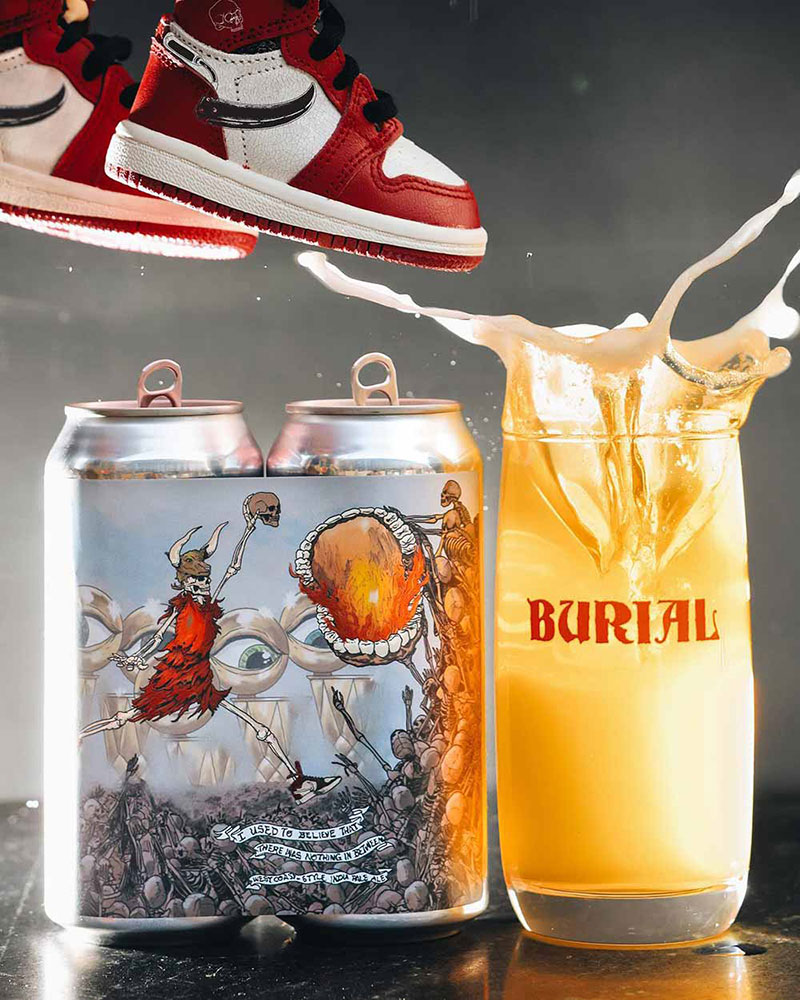
Photography courtesy of Burial Beer Co.
Cassella, who says he has one naming credit (the hoppy porter Lightgrinder), says Burial mixes it up a bit, but the bulk of the names come from owner Doug Reiser.
“[Reiser] has doled out that responsibility over the years,” Cassella says. “Brewers making new beer come up with the new name. But it’s mainly the production crew and Doug in tandem.”
Richardson says that while everyone has access to creating new names, he has named “about ninety-eight percent of it.”
“Usually I name it and we roll with it,” he says. “Certain things we choose that will head to the grocery store, our senior brew team will get a look at it.”
But Richardson went on to say that when things stay in-house, they have a bit more flexibility.
“That’s the unique position we’re in. It allows us to be super creative and create a bunch of labels,” he says. “Once you get into distro, it gets more challenging.”
Toth says that at Divine Barrel, it’s all hands on deck.
“Everybody puts their names into the spreadsheet,” he says. “Sometimes a text comes in the middle of the night asking to put new name ideas into the sheet.”
Should You Name Then Make the Beer or Vice Versa?
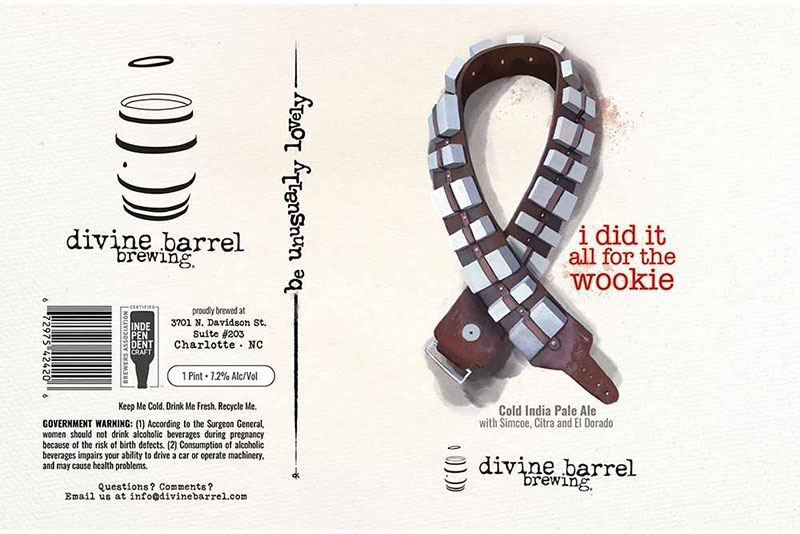
Graphic courtesy of Divine Barrel Brewing
That really depends. Toth says Divine Barrel often finds themselves brewing up the beer and they still aren’t certain what the name will be—unless it’s a flagship beer, of course.
“Sometimes we have flashes of brilliance and name it in production meetings,” Toth adds.
Other Half is all over the place with their plans for naming.
“Usually [we] make the name first,” Richardson confesses. “And then sometimes we make the beer after to match up with the name. And then sometimes it’s totally random.”
He adds, “We’ve always tried to make it irreverent and fun, and a lot of inside jokes.”
Cassella says that Burial builds out their production schedule about three to six months ahead of time, so in the calendar, a style is established.
“As we get closer, about six weeks out we have a name and then the artwork,” he says.
Are There Concerns With Other Breweries Stealing Names?
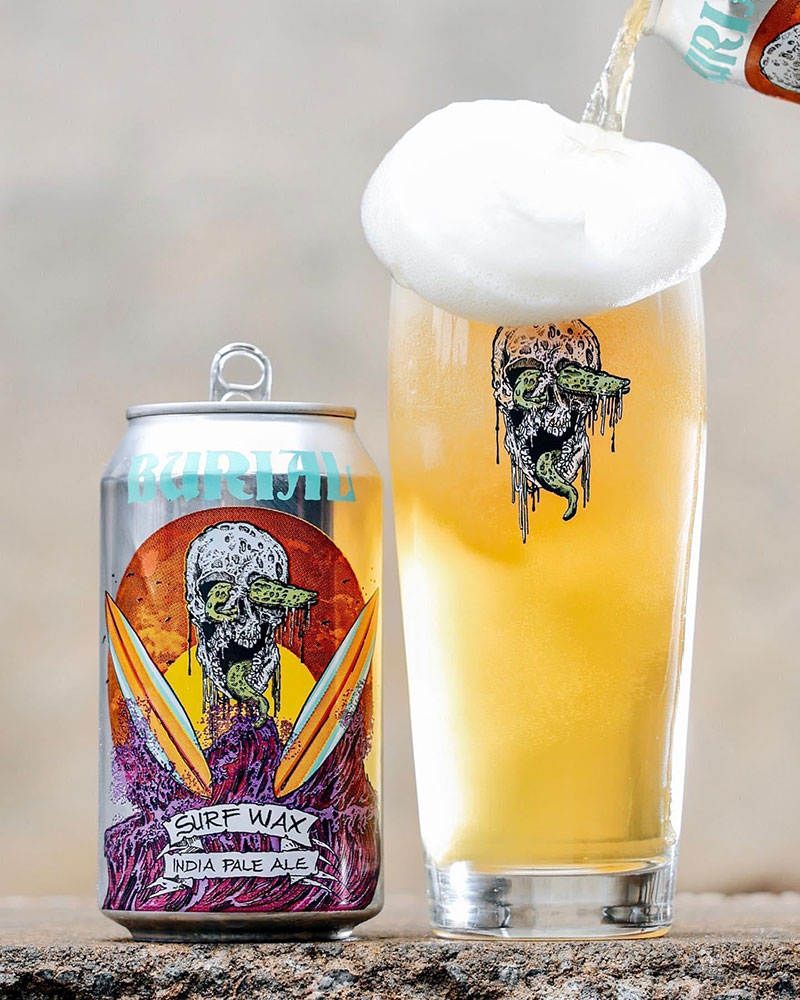
Graphic courtesy of Burial Beer Co.
“Typically we don’t have that issue because our names are so long and off the beaten path,” he says. “We do check to make sure we aren’t using other breweries’ names, though. But our beer names are four to six, seven, eight words. Thankfully we have avoided that problem.”
Toth doesn’t make a big deal unless the other brewery is super close in proximity to Divine Barrel.
“We do try to text and call people and let them know if they are taking one of our names,” he says. “If they are two blocks away, we don’t want that. If they’re 2,000 miles away, it’s not a big deal.”
Richardson says Other Half does their due diligence when they go into naming a beer.
“We … almost always do research to make sure it’s never been done. Something outlandish, I’m almost certain it’s not taken and we won’t [steal another beer’s name],” Richardson says. “If we step on anyone’s toes, we’ll pull it out. It’s not a good practice to fight.”
He adds, “We come across people using our name and branding, and if it’s egregious we’ll ask them to stop. It’s a problem industry-wide.”
Any Federal Concerns With Creating Beer Names?
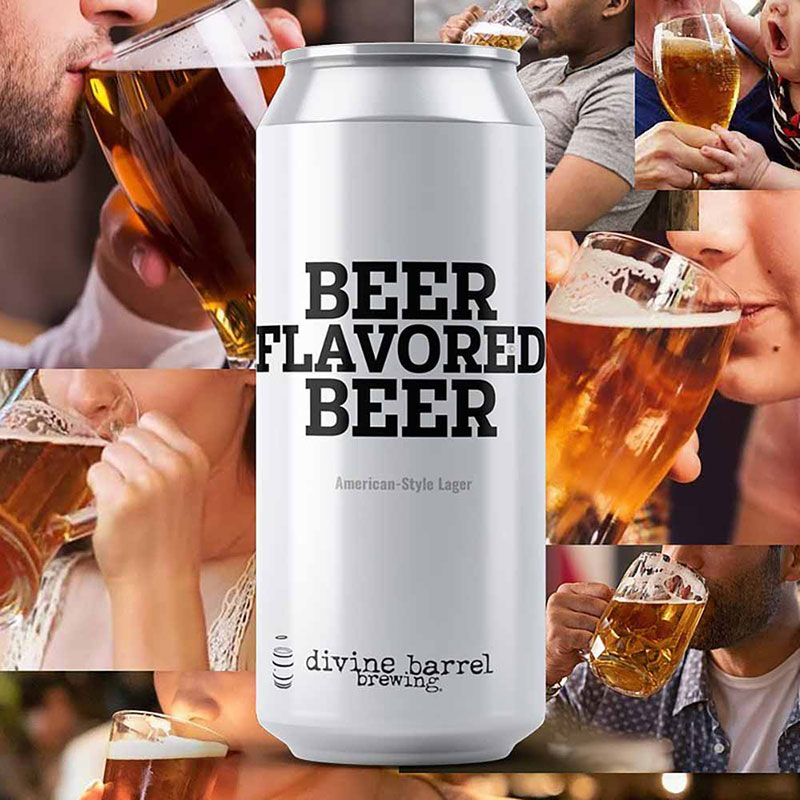
Photography courtesy of Divine Barrel Brewing
For Divine Barrel, Toth says they have run into some issues, which only happens when you are sending beer across state lines, which brings the TTB into play.
“Beer Flavored Beer is not allowed by the TTB, so that stays in the state,” Toth says. “Beer is not a flavor.”
Toth adds that sometimes they don’t make beers for interstate distribution because they don’t want the TTB to know their formulas and force them to put phrases like “made with artificial flavors” or “flavored naturally with…”
Richardson says they occasionally have issues with the TTB, but it’s not something they can’t work out.
“We do the best to resolve it with them,” he says. “One time, we got questioned over a single-hop IPA called Simcoe IPA because of the use of the word Simcoe. We had to explain to them Simcoe is a hop.”
Cassella said they have never run into any TTB issues with any of their names.
Any Worry of Running Out of Names?
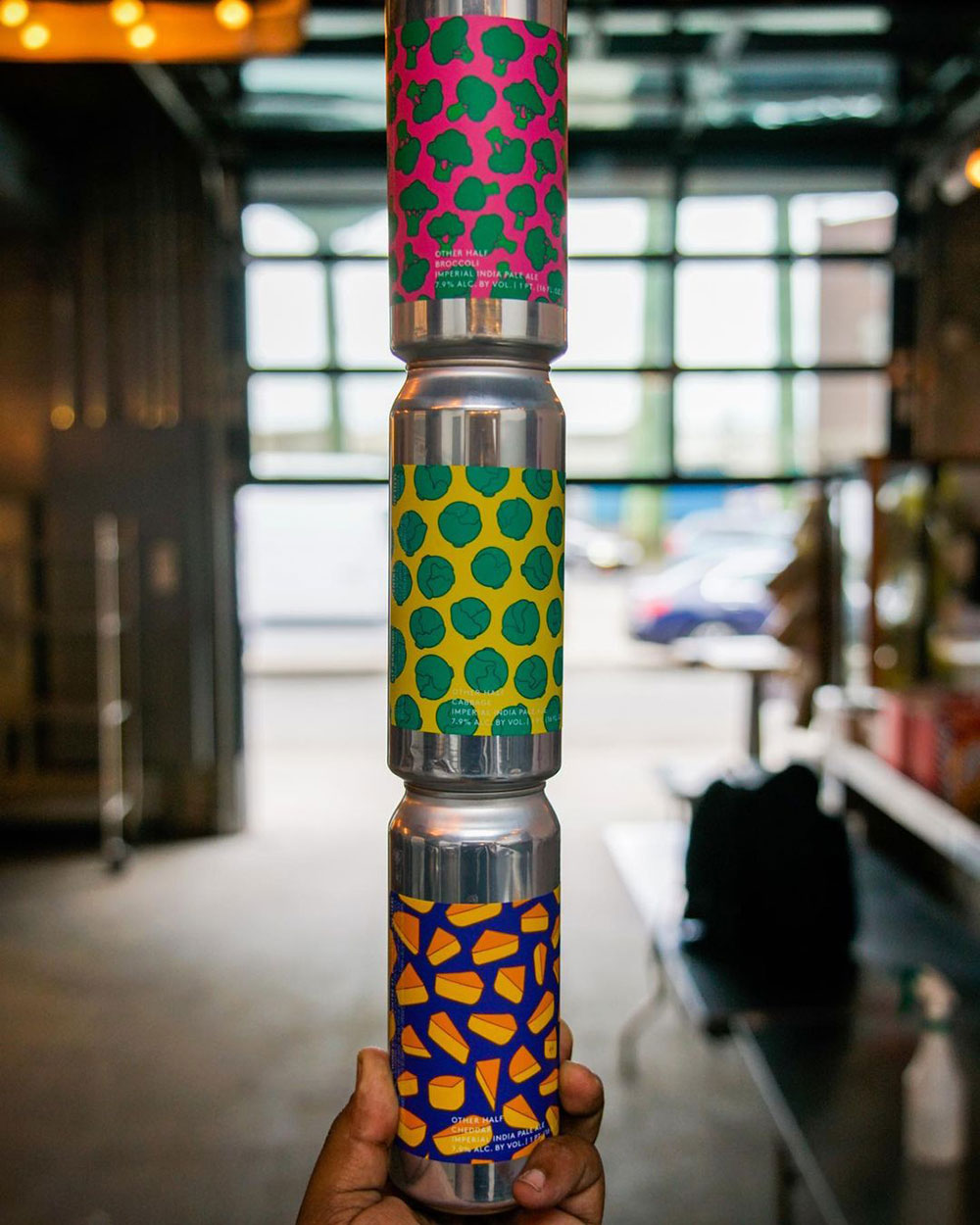
Photography courtesy of Other Half Brewing Co.
Cassella says he worries about running out of beer names but believes Burial’s uniquely long beer names will help them avoid that issue.
“The way we name the beers, I don’t think we could run out of names,” he says.
Richardson says he isn’t too concerned with finding a new name, but more about whether that name would be a good one.
“It’s about how much bandwidth I have and the team has to come up with something good,” Richardson says. “Sometimes it’ll be a dud, and those are the risks you have to take. But occasionally you think of a dud and people like it and it turns out good.”
When asked whether he thought Divine Barrel would run short on names for their beers, Toth said matter-of-factly: “No.”
Three Examples of Great Beer Names
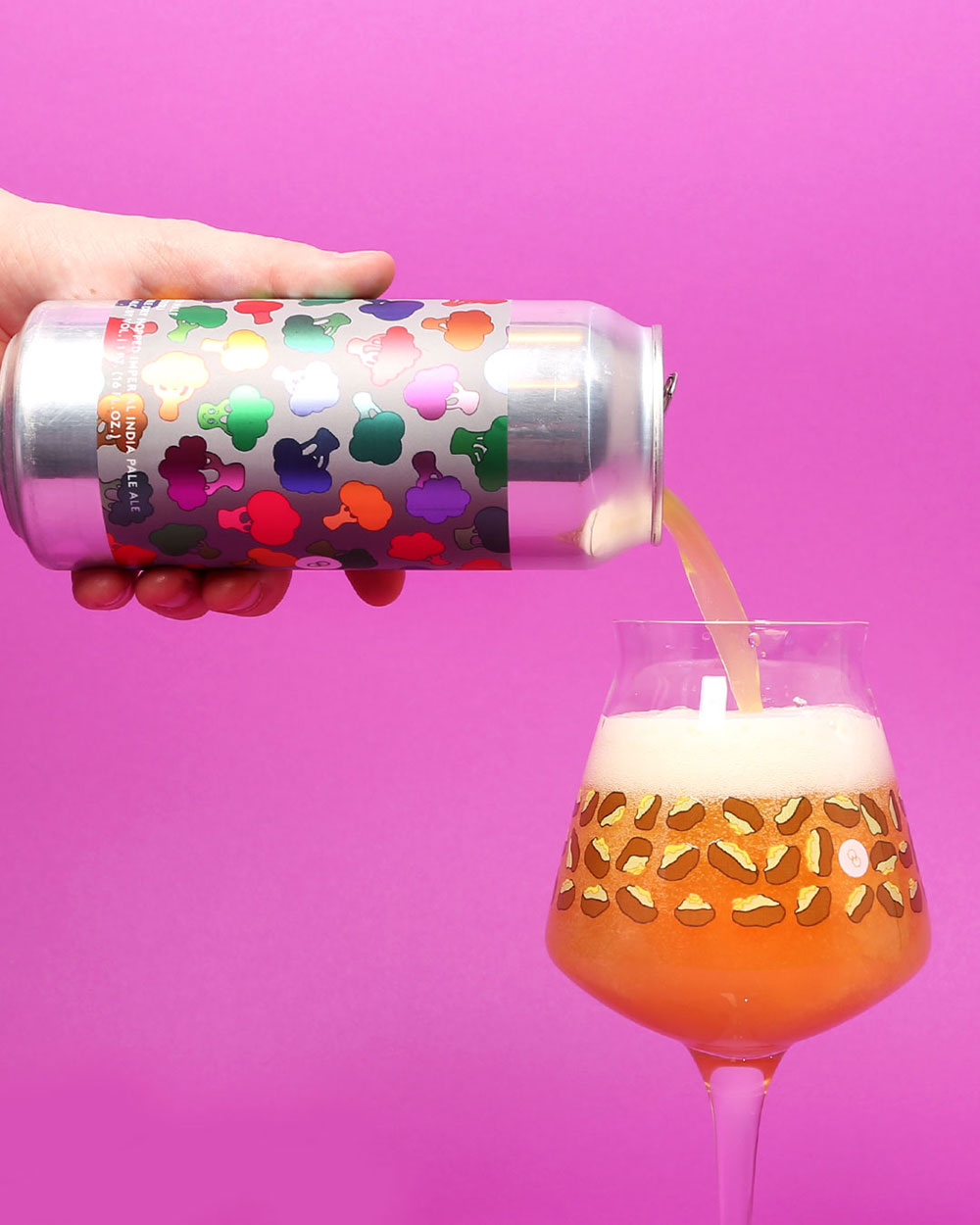
Photography courtesy of John A. Paradiso
For Richardson, it was easy.
“I think the name Broccoli was one of the most successful names,” he says. “It kind of defines our brand.”
Cassella says he is drawn to Burial’s flagship, Surf Wax.
“I like it because it’s a hidden ‘Point Break’ reference,” he says. “The longer copy on the can has a series of quotes from the movie and tells a story itself.”
Cassella adds, “Our names allow for Easter-egg storytelling. There is a deeper meaning than what you might think. Ninety-nine percent of the time, there is a story we can tell behind the beer.”
Toth couldn’t fall on just one, citing Ice Cream Paint Job and Carolina Cobbler as a couple of names that stand out.



